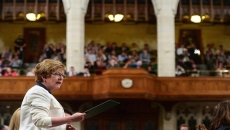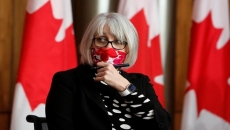Transport Canada is looking at ways to include used vehicles in a federal rebate for electric cars — something observers say is needed to make the program more relevant to low or middle-income consumers, rather than only those able to buy brand new.
Their recommendation comes while a new analysis also shows more than $100 million of the almost $300 million in subsidies issued so far have gone to Tesla drivers.
The program offers buyers an upfront discount of up to either $5,000 or $2,500 and sellers then have to claim the incentives to be reimbursed.
The Liberal government introduced the subsidy in 2019 for those buying or leasing new zero-emission vehicles, including businesses and local governments, as a way to reduce transportation pollution.
From then until early 2021, government agreements show Tesla was reimbursed around $102 million of the roughly $296 million sent to individual dealerships selling electric vehicles from 15 different automakers.
Next to Tesla — which sells directly to customers — Hyundai dealerships saw the second highest reimbursement amount of $50 million, followed by Chevrolet dealerships at nearly $40 million.
Unlike the latter two, which have a selection of electric vehicles that qualify for rebates, Tesla currently only has one, its Model 3.
With a manufacturer's suggested retail price for a standard range at $44,999, the Tesla Model 3 squeezes in just below the program's cutoff for a low-end model of $45,000.
The pricing strategy used by automakers, including Tesla, is why a parliamentary committee that studied the use of electric vehicles, recommended last month that the program's overall price cap be reviewed.
"To date, consumers who have purchased the Tesla Model 3 represent approximately 25 per cent of the total (program) claims," reads a statement from Transport Canada, provided by spokesperson Cybelle Morin.
"The Tesla Model 3 is the best-selling electric vehicle in the world."
The department said providing consumers with vehicle options is important "to increasing the adoption of zero-emission vehicles in Canada."
For Germain Belzile, a senior associate researcher on energy issues at the Montreal Economic Institute, the overarching policy goal should be to reduce carbon-related emissions, not to get more electric vehicles on the road.
He said such subsidies may be a political "winner," but are an expensive, inefficient way to reduce emissions of heat-trapping greenhouse gases in transportation compared to charging a higher carbon price on fuel.
Belzile co-authored a study in 2017 that looked at the provincial subsidies in Quebec and Ontario, which found together, those could cost more than $17 billion by 2030 and only slash emissions by less than four per cent annually.
“It’s like cellphones," he said. "Cellphones have existed for a long time, but very few people used cellphones 35 years ago, for example, and that’s because they were very expensive and we didn’t need subsidies to eventually increase the usage of cellphones.”
But Ottawa and others, including U.S. President Joe Biden, increasingly look to electric cars as a way to transition the auto sector into a world less reliant on fossil fuels and cut transportation pollution.
Canada has a sales target to have 10 per cent of all light-duty cars be electric by 2025.
“It’s going to become a real affordability issue in terms of whether the government wants to spend that much money on helping people get to those targets by 2025," said David Adams, president of the Global Automakers of Canada.
He said incentives should remain available for at least the next few years until the price gap closes between electric vehicles and ones powered by traditional internal-combustion engines.
In its own analysis, Ottawa has acknowledged the early adopters of electric vehicles tend to be well-educated, higher-income men living in cities.
Joanna Kyriazis, a senior policy adviser at Clean Energy Canada, says when it comes to Tesla, the giant "has made and built electric cars that people actually want to buy" and other companies have caught on.
She pointed to Ford's recent unveiling of its electric F-150 truck.
“If you looked at what Ford was really selling there, it was power, speed, intelligence, American ideals of freedom and independence," said Kyriazis.
“It wasn't, 'Drive this to be an environmentally responsible citizen.'"
Both she and Adams would like to see at least one key change to the federal rebate program — expanding it to include used vehicles, also called for in the report from Parliament.
"You find the highest interest in (electric vehicles) amongst the younger demographic that, let's just face it, in most instances are the ones that are least able to afford to purchase the vehicle," Adams said.
Kyriazis said around 60 per cent of car sales happen in the used market.
Paying the upfront cost for an electric vehicle off the lot is a barrier for Canadians with modest incomes, who would benefit the most from its lower fuel and maintenance costs, she added.
Kyriazis sees another possible way to ensure benefits aren't going to those who could afford to buy an electric vehicle without the financial support: introduce an income cap, or provide more money for low-income earners.
Transport Canada is exploring options for expanding incentives to include used zero-emission vehicles, which would broaden access to such vehicles for more Canadians, the department said in a statement.
Last fall, Ottawa announced it was pumping another $287 million into the $300 million program because its popularity meant the cash was drying up sooner than the end date of 2022.






